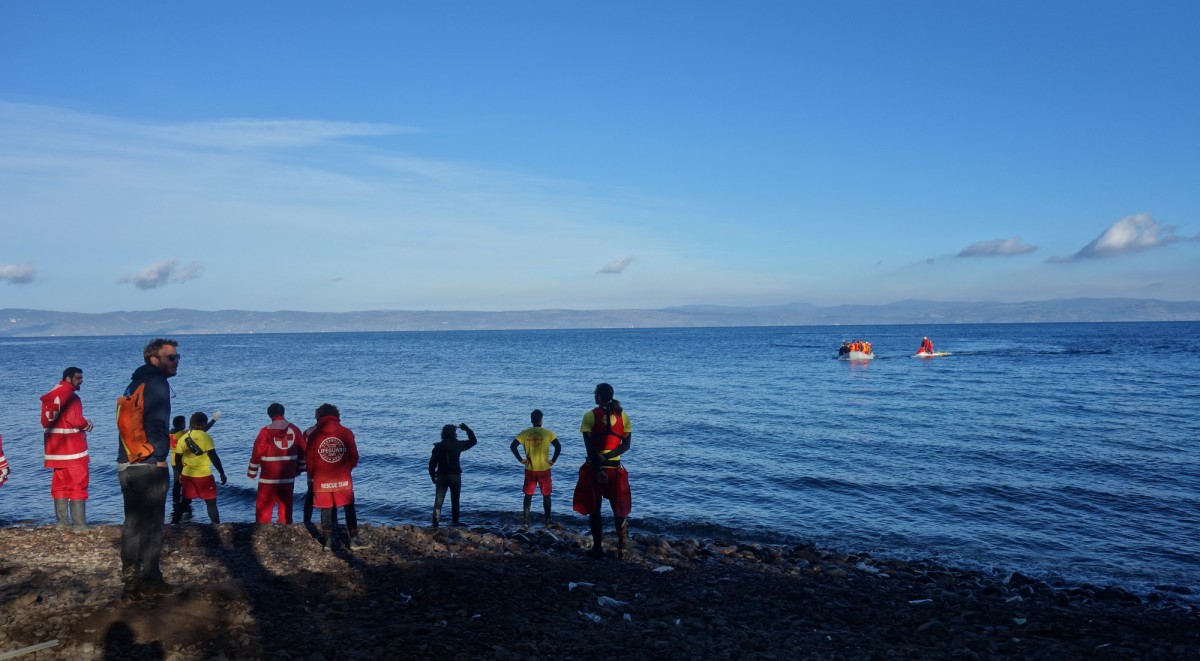
Chaos … do this; no, do that … police is doing no registration today; no, they do registrations this afternoon … blankets are handed out at 8pm, or maybe at 9pm … cook asks how much food he should prepare; cooking today for 50 or for 300 people dinner? … misunderstanding with Arabic speakers … ferries leave today, or not because there are only few refugees arriving tonight …
During the last two weeks in Lesvos these were everyday questions and issues. The situation appeared totally chaotic, but the unpredictability is the nature of this crisis. Is it a matter of the weather, the local or international politics, or maybe the smugglers, which factor decides how many refugees arrive each day on the island – well it is for sure a mixture of all. During the peak times at the end of October and beginning of November up to 10’000 people arrived each day to Lesvos, now the numbers have drastically decreased, but it stays unpredictable; time, place and number of people who manage the tough crossing of the Aegean Sea change on a daily basis.
My tasks included everything from crowd control in front of the registration gates and distribution of food, blankets and clothes to cold and wet people, to cooking food for hundreds of people. Making a night shift to wait for boats arriving at the northern coast of Lesvos, packed with dozens of people; cold, shocked and wet from their mission to cross into the EU. Some just take one hour in a rubber boat, but others stay on the sea for numerous hours because of small or broken engines, overloaded boats and/or unexperienced refugees as captains on the engine. On windy days which caused the sea to be unpassable for small boats we made the best of our time and helped picking trash in the camps to make them look a bit more humanitarian.
Talking to all those refugees with little to very good English skills was the most exciting and interesting of these two weeks. On one calm night shift in Kara Tepe, a registration camp, we joined three Syrians who were waiting for money which was supposed to be sent from back home for their further journey. Those guys were talking about the last night’s soccer game with the same excitement I see in my friend’s eyes when they are fascinated by the last day’s soccer game. While standing at the main registration gate, it did not take long until someone was standing next to you to chat and to help to organize the crowd to pass the gate in an ordered fashion by their ticket numbers and in the random speed of police registrations. I got amused by the size of families with over ten members and impressed by the challenge parents are facing with trying to escape the war with five little kids. In calm moments we found time to look for a little toy or a sweet in the storage rooms to give to kids and bring a smile on their face.
The effect on the island is visible at every corner. If it is the life jackets which are found everywhere along the island, or boat wrecks on the shores and in the harbors, waiting refugees in the harbor and in Mytilini. There is a massive ‘life jacket cemetery’ on the north which is incredible and makes clear the dimensions of this crisis. Many locals try to help, from small acts like putting a multi-plug for recharge of phones in front of their shops, to helping out cooking food for dinners or spending some of their free time in the camps to help.
From my personal experience and my point of view there is no desperate need for volunteers on the island right now and the basic support from volunteers should be provided by the numerous people from all over the world who planned already to come during the next months. Right now time is probably better spent at your home place to start or support an integration project in your community which will be challenged by the task to integrate those refugees who arrived after their long way from Syria and other countries. But keep up following the situation, time can change everything so quickly and the situation can look very different from one to the next day as I could see during the two weeks in Lesvos. Currently the Turkish are getting more active in stopping the work of smugglers which might decrease the numbers of refugees crossing the passage at least for the next weeks.
The last two weeks were very interesting and well spent. I am happy that I supported those who are in need for a safer future. The numbers of refugees on the Greek islands decrease, but in the future months everyone of us is challenged to do their best to help integrate those who had to leave their homes and lost or left behind their friends. The cultures are different, the languages are different, but together we can decide if integration has the possibility to work or not.
I could continue writing for a couple of more pages, but please call or write me, if you have questions, or just want to talk about the experiences.









One Coment, RSS